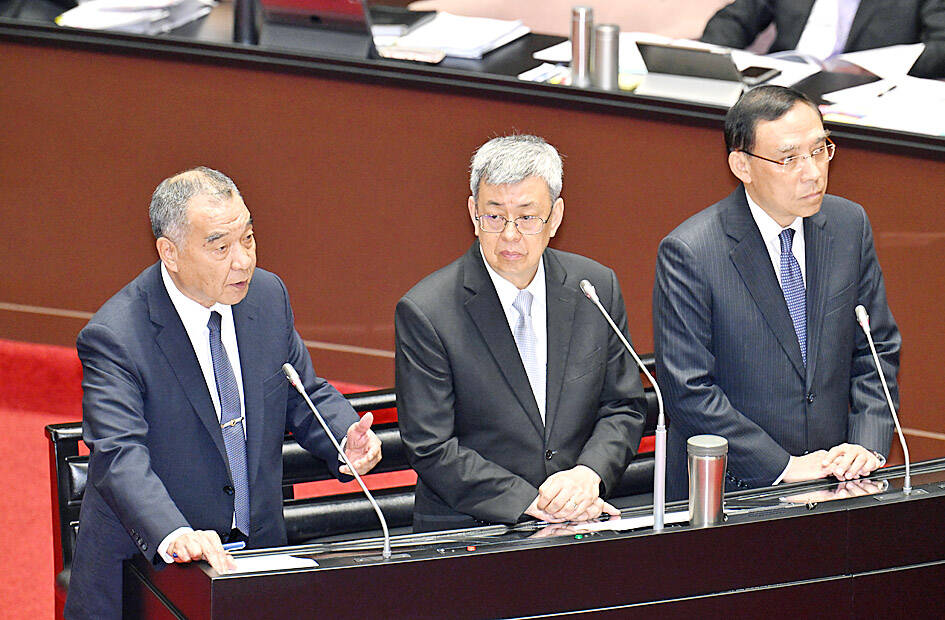The military is intensifying countermeasures to prevent Chinese infiltration of its ranks and stepping up evidence-gathering in espionage cases to facilitate prosecution, Executive Yuan officials said at a plenary session at the Legislative Yuan in Taipei yesterday.
That was in response to criticism by Democratic Progressive Party Legislator Liu Shyh-fang (劉世芳) that prison sentences meted out in national security law cases were too lenient.
Other countries hand out stiff sentences of 30 years to life in prison for members of the armed forces who spy on their country for a hostile power, Liu said.

Photo: Tien Yu-hua, Taipei Times
Citing data from the Ministry of Justice, Liu said that the average sentence handed out to people convicted of betraying secrets to Beijing was 6.18 months in prison, which is lax in light of the repeated warnings Taiwan has received from its allies about communist infiltration.
Minister of National Defense Chiu Kuo-cheng (邱國正) acknowledged that some unidentified military personnel who have been compromised by China might still be serving in security-sensitive positions in the armed forces.
About one-third of service members implicated in leaking national security secrets to China were on active duty, while the remainder were retirees, he said.
Military personnel must follow the law regardless of their service status and former service members who spy for China would still be held accountable, Chiu added.
Although the ministry cannot comment on the handling of espionage cases by the judicial system, the military has stepped up efforts to raise troop awareness against Beijing-directed espionage and is conducting investigations to gather potential evidence for prosecution, he said.
The Ministry of Justice agrees with the assessment that judges are handing down overly lenient sentences for national security breaches, but sentencing is a prerogative of the court, Minister of Justice Tsai Ching-hsiang (蔡清祥) said.
Should prosecutors have cause to appeal a sentence, they will pursue it to the full extent of the law, he added.
The justice ministry is collaborating with the defense ministry to educate prosecutors on the crucial importance of prosecuting espionage cases and plans to appoint special prosecutors to try espionage cases, he said.
Premier Chen Chien-jen (陳建仁) said the justice ministry has been instructed to improve law enforcement’s ability to obtain evidence that can help clinch heavier penalties in cases involving Beijing-directed espionage.
Prosecutors should be encouraged to appeal verdicts that do not fit the crime, he said.

Taiwan is stepping up plans to create self-sufficient supply chains for combat drones and increase foreign orders from the US to counter China’s numerical superiority, a defense official said on Saturday. Commenting on condition of anonymity, the official said the nation’s armed forces are in agreement with US Admiral Samuel Paparo’s assessment that Taiwan’s military must be prepared to turn the nation’s waters into a “hellscape” for the Chinese People’s Liberation Army (PLA). Paparo, the commander of the US Indo-Pacific Command, reiterated the concept during a Congressional hearing in Washington on Wednesday. He first coined the term in a security conference last

DEFENSE: The National Security Bureau promised to expand communication and intelligence cooperation with global partners and enhance its strategic analytical skills China has not only increased military exercises and “gray zone” tactics against Taiwan this year, but also continues to recruit military personnel for espionage, the National Security Bureau (NSB) said yesterday in a report to the Legislative Yuan. The bureau submitted the report ahead of NSB Director-General Tsai Ming-yen’s (蔡明彥) appearance before the Foreign and National Defense Committee today. Last year, the Chinese People’s Liberation Army (PLA) conducted “Joint Sword-2024A and B” military exercises targeting Taiwan and carried out 40 combat readiness patrols, the bureau said. In addition, Chinese military aircraft entered Taiwan’s airspace 3,070 times last year, up about

A magnitude 4.3 earthquake struck eastern Taiwan's Hualien County at 8:31am today, according to the Central Weather Administration (CWA). The epicenter of the temblor was located in Hualien County, about 70.3 kilometers south southwest of Hualien County Hall, at a depth of 23.2km, according to the administration. There were no immediate reports of damage resulting from the quake. The earthquake's intensity, which gauges the actual effect of a temblor, was highest in Taitung County, where it measured 3 on Taiwan's 7-tier intensity scale. The quake also measured an intensity of 2 in Hualien and Nantou counties, the CWA said.

The Overseas Community Affairs Council (OCAC) yesterday announced a fundraising campaign to support survivors of the magnitude 7.7 earthquake that struck Myanmar on March 28, with two prayer events scheduled in Taipei and Taichung later this week. “While initial rescue operations have concluded [in Myanmar], many survivors are now facing increasingly difficult living conditions,” OCAC Minister Hsu Chia-ching (徐佳青) told a news conference in Taipei. The fundraising campaign, which runs through May 31, is focused on supporting the reconstruction of damaged overseas compatriot schools, assisting students from Myanmar in Taiwan, and providing essential items, such as drinking water, food and medical supplies,